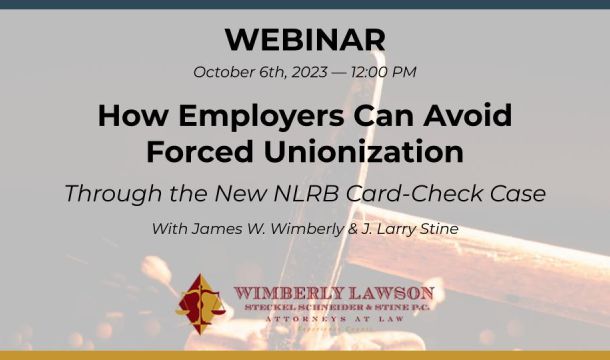New Georgia Department of Labor Initiative Supports Immigration Compliance
Effective January 1, 2019, the Georgia Department of Labor (GDOL) will reject Quarterly Tax and Wage Reports containing certain invalid Social Security numbers (SSN) and may assess delinquency fees against employers failing to submit complete or correct reports by the due date. However, an employer submitting a corrected report after the due date when it timely submitted the original probably will not receive an assessment if the corrected report is submitted in a timely manner as directed by GDOL. Regardless, GDOL will keep the unemployment insurance taxes paid to it with the rejected reports.
Although the GDOL normally will not access the federal SSN database, it has identified the most common invalid SSN formats:
- SSN field is blank (i.e., no number reported)
- SSN is “987-65-4321”
- SSN is not numeric
- SSN begins with “000”
- SSN is not nine digits
- SSN begins with “666”
- multiple employees are reported with the same SSN
- SSN has middle two digits of "00"
- SSN has last four digits of “0000”
- SSN consists of the same digits, i.e., 111-11-1111
- SSN contains dash(es)
- SSN with the last four digits only
- SSN begins with “9”
- SSN is “123-45-6789”
The GDOL reportedly is implementing this new policy in response to actions taken by the United States Department of Labor (DOL) to prevent those working illegally in the United States from receiving unemployment benefits. 8 U.S.C. § 1621 prohibits states from providing unemployment benefits to illegal aliens. It appears the DOL is forcing the State to see that this does not occur. The federal government purportedly will sanction the GDOL if an employee working illegally in the United States receives unemployment benefits from Georgia. Apparently, the GDOL does not wish to be punitive with Georgia employers and normally will not report the discrepancies listed above to the federal government. Rather, it wants to avoid sanctions from the federal government.
Practical steps exist which employers can take to protect themselves under this policy. Georgia law makes it a misdemeanor punishable by imprisonment of up to one year and/or a fine of up to $1,000 for knowingly making false statements in reports, knowingly failing to make disclosures in reports or willfully failing to make a report to the GDOL. Thus, employers want to show the GDOL that when they provide an invalid SSN they did so unknowingly and not willfully. If the GDOL rejects a report, a possible approach is to simply redo the report by correcting mistakes and providing all the right information. In addition, it is recommended that the employer should include a written explanation for any errors that occurred. Finally, an employer could state whether the employee is still employed or whether the employer had taken steps including giving the employee an opportunity to correct the SSN in question.
In addition to the most common invalid Social Security number formats, an employer may also find its report rejected for other reasons. For example, if the GDOL discovers that an individual is acting as a straw person and allowing his name and SSN to be used by multiple persons, the GDOL may make an inquiry with the Social Security Administration to determine if multiple employees are illegally using one SSN. In addition, when the GDOL sees the same name and SSN on reports from multiple employers, it could subject those employers to audits to determine if the employer is intentionally and willfully sending statements with false information to the GDOL.
Compliance with E-Verify should eliminate most of the problems an employer could encounter with a falsified SSN or a person using another’s SSN. As of July 1, 2013, all Georgia employers with more than 10 workers and all employers that have a public contract in excess of $2,499.99, i.e., contract with a city, county, the state, a school board, etc., must participate in E-Verify which requires employers to register with and utilize the “federal work authorization program.” Independent contractors and employees who are not expected to work at least 35 hours per week do not count as part of the ten employees under the Georgia E-Verify statute. The state Attorney General has the authority to investigate and bring misdemeanor charges against any person or business that does not comply with the requirements of the Georgia E-Verify Law.
This policy is in its infancy stage and the GDOL can conduct more audits and target certain industries that have a pattern of invalid SSNs filed with the quarterly reports. Employers should get legal guidance to properly address the issue of providing accurate reports to the GDOL.
Each employer should recognize that it has an obligation to investigate further when an employee provides an invalid SSN. Federal law prohibits employment of individuals who are not authorized to work in the United States and an employer can be subject to civil and criminal penalties for employing an unauthorized worker. If an employer has actual knowledge that a person is not authorized to work in the United States, the employer must not hire or continue to employ the person. If an employer has constructive knowledge that a person is not authorized to work in the United States, the employer must not hire or continue to employ the person. Constructive knowledge can exist when an employee provides an invalid SSN and cannot resolve the problem within a reasonable time. If an employee provides an invalid SSN, the employer should consult with legal counsel to determine the appropriate procedures for resolving the issue. In addition to liability for employing unauthorized workers, invalid SSNs may result in tax penalties with respect to wage reporting and health care coverage reporting. Thus, when an employee provides an invalid SSN, the employer must take steps to protect itself from liability.
Questions? Need more information? Email Les Schneider (las@wimlaw.com) or James W. Wimberly, Jr. (jww@wimlaw.com) or call them at (404) 365-0900.
Related Content
Get Email Updates
Recent Content

NLRB to Seek Rescission of past Discipline Imposed under Overbroad Employer Work Rules

Do Drive Cam Cameras inside Trucks Violate Employee Rights?

Amazon Considers Risk When Investigating Employee Misconduct

Latest NLRB Attack Goes beyond Non-Compete Agreements to Reach Outside Employment

NLRB Board Addresses BLM Insignia at Work




